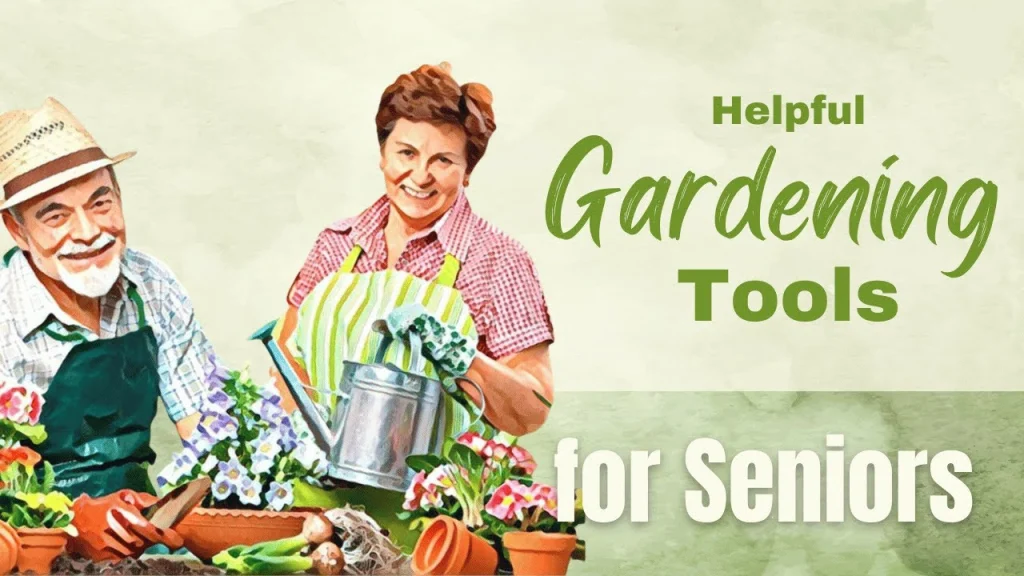
12 Gardening Aids for Seniors to Make Gardening Easier for Them
Gardening, a timeless pastime, is more than just a hobby. Tending to plants and cultivating a garden offers a multitude of physical and mental health benefits. Studies have shown that gardening can reduce stress, improve mood, and even lower the risk of chronic diseases. But the question that many people ask is how they should start their work and what are the gardening aids for seniors?
As we said in gardening gifts for elderly by regularly engaging in gardening, seniors can experience a wide range of physical, mental, and social benefits that contribute to a higher quality of life. Gardening can be adapted to fit individual abilities and preferences, making it a rewarding and accessible activity for people of all ages.
Given its numerous advantages, it’s no wonder that gardening has become a popular pursuit among people of all ages. However, as we age, the physical demands of gardening can become more challenging. This article from humanhealthmag aims to address this issue by providing a comprehensive guide to gardening aids especially for seniors. We will explore a range of tools and equipment that can make gardening more accessible, enjoyable, and less strenuous for older adults, enabling them to continue reaping the rewards of this rewarding activity.
Health Benefits of Gardening for Seniors
Gardening offers a wealth of benefits for people of all ages, but it can be particularly beneficial for seniors. Even a small garden or a few potted plants can provide significant health benefits. For seniors, it’s important to choose plants that are easy to care for and to use ergonomic gardening aids for seniors to reduce strain.
Physical Health Benefits:
- Improved physical fitness: Gardening involves a range of physical activities, such as digging, planting, and weeding, which can help improve strength, flexibility, and balance.
- Weight management: Regular gardening can contribute to weight management by burning calories and increasing physical activity.
- Enhanced immune system: Spending time outdoors, especially in a garden, can boost the immune system and reduce the risk of certain illnesses.
- Strengthened bones: Weight-bearing activities like gardening can help maintain bone density and reduce the risk of osteoporosis.
Mental Health Benefits:
- Reduced stress and anxiety: The repetitive motions and connection with nature involved in gardening can have a calming effect, reducing stress and anxiety.
- Improved mood: Gardening has been shown to increase levels of serotonin, a neurotransmitter that helps regulate mood, leading to feelings of happiness and well-being.
- Enhanced cognitive function: Engaging in gardening activities can stimulate the brain and improve cognitive function, including memory and problem-solving skills.
- Increased sense of purpose: Caring for plants and seeing them grow can provide a sense of accomplishment and purpose.
Social Benefits:
- Social interaction: Gardening can be a social activity, allowing seniors to connect with others, share their knowledge, and build relationships.
- Community involvement: Participating in community gardens or gardening clubs can foster a sense of belonging and connection to the community.
Additional Benefits:
- Increased exposure to sunlight: Spending time outdoors gardening can improve vitamin D levels, which is essential for bone health.
- Access to fresh, healthy produce: Gardening can provide seniors with a steady supply of fresh, organic fruits and vegetables, promoting a healthy diet.
- Improved sleep: Physical activity and exposure to sunlight can contribute to better sleep quality.
Gardening Aids for Seniors
To start gardening at home, you don’t need a vast array of tools. A few essential gardening aids for seniors will suffice for most gardening tasks. These tools, such as a shovel, trowel, rake, and garden gloves, are versatile and can be used for a variety of gardening activities. By investing in high-quality tools, you can ensure that your gardening experience is both efficient and enjoyable. With the right tools, you can easily prepare your soil, plant seeds and seedlings, and maintain your garden throughout the growing season.
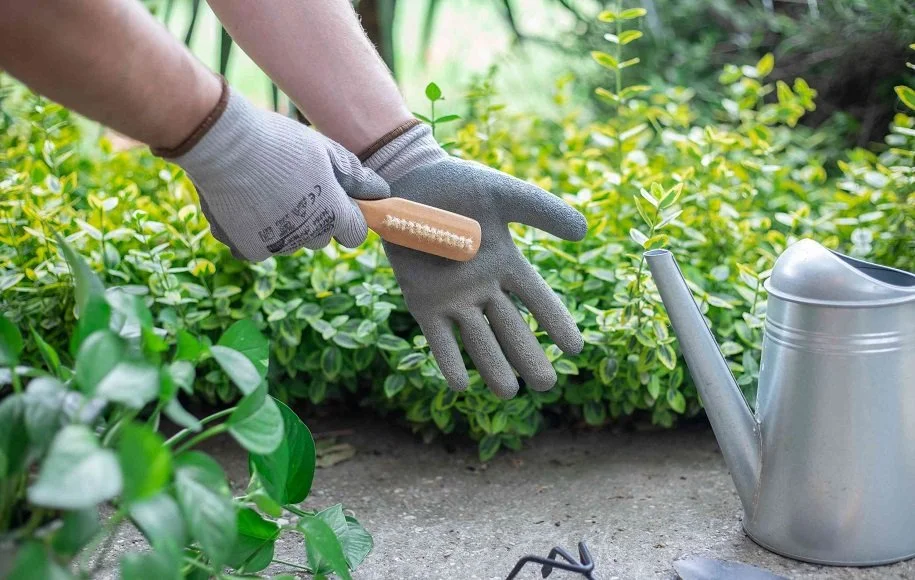
1- Gloves
Gardening gloves are an essential piece of safety equipment for any gardener. Not only do they protect your hands from thorns, dirt, and chemicals, but they also provide a comfortable grip when handling tools and plants. When selecting gardening gloves, look for pairs that are durable yet flexible, and ensure they fit snugly without being too tight. Water-resistant gloves are ideal for protecting your hands from moisture and dirt. Additionally, gloves with a long cuff can help keep dirt and debris out of your sleeves. Proper care of your gardening gloves will extend their lifespan and ensure your continued comfort and safety while gardening.
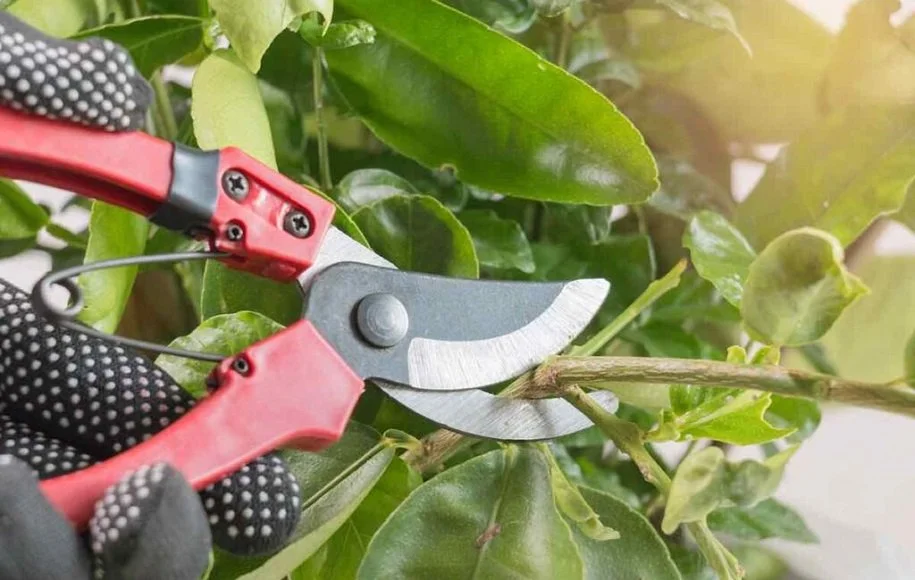
2- Pruning Shears
Pruning Shears come in two primary types: anvil and bypass. Anvil shears have a sharp blade that cuts against a flat surface, similar to a knife cutting on a chopping board. They are best suited for cutting dead or dry wood. Bypass shears, on the other hand, have two blades that pass each other, resembling traditional scissors. These are ideal for cutting live plant material as they provide a cleaner cut.
When selecting this gardening aids for seniors, choose a pair that is comfortable to grip and easy to operate. For individuals with arthritis or weak hands, ratchet pruners can be a good option as they require less force to make a cut. Regular sharpening is essential to ensure clean cuts and prevent damage to plants.
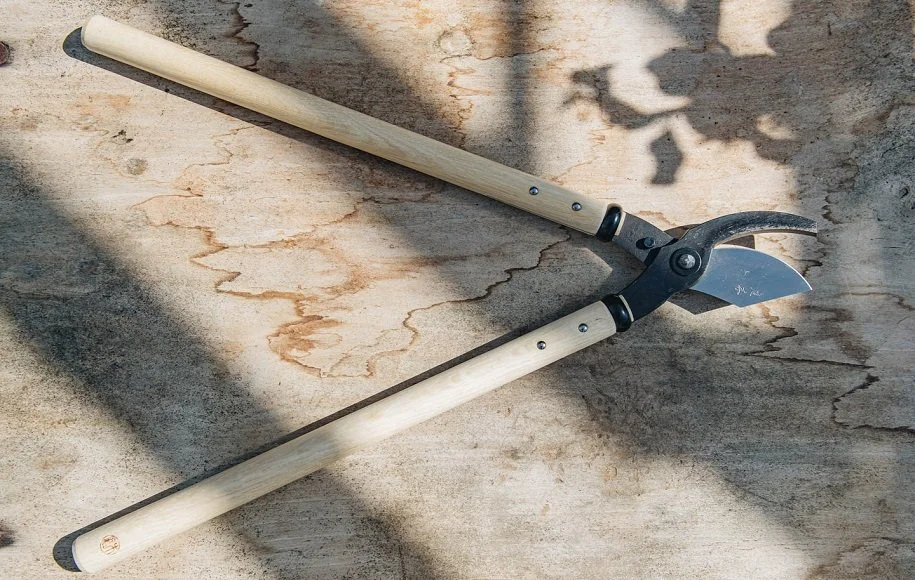
3- Loppers
Loppers are long-handled pruning tools designed to cut thick branches that are out of reach. They are essentially heavy-duty shears with extended handles to provide leverage for cutting larger branches. Loppers come in both anvil and bypass styles, with bypass loppers generally providing cleaner cuts. The length of the loppers can vary, with telescopic handles available for reaching even higher branches. When choosing loppers, consider the thickness of the branches you need to cut and the weight of the tool. Lighter materials like aluminum or carbon fiber can reduce fatigue during use. Regular sharpening is essential to maintain the cutting efficiency of loppers.
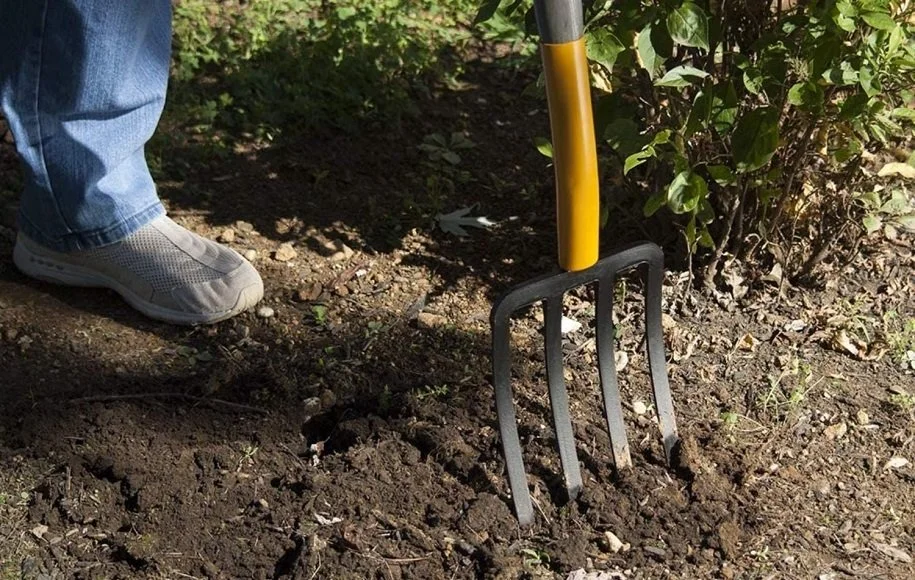
4- Garden Fork
A garden fork is a versatile gardening tools for elderly used for various gardening tasks. Its tines, or prongs, are designed to penetrate and loosen compacted soil, making it easier to turn and aerate. Garden forks are particularly useful for breaking up clay soil and removing weeds, as their tines can reach deep into the soil to cut through roots. The shape of the tines can vary, with curved tines being ideal for incorporating organic matter, while straight tines are better for digging in heavier soils. When selecting a garden fork, look for one with strong, durable tines and a comfortable ergonomic handle. For long-lasting performance, choose a fork made from high-quality materials like stainless steel.
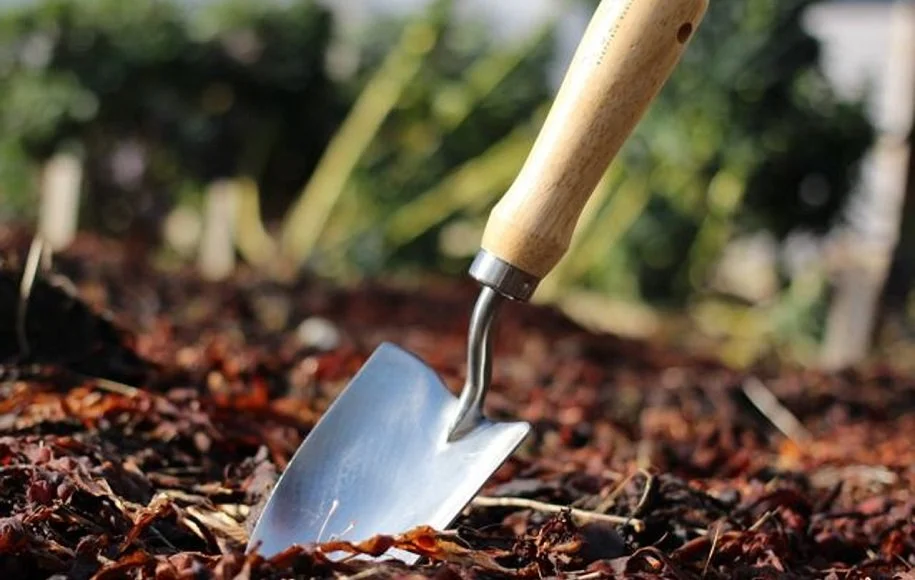
5- Hand Trowel
A hand trowel is an indispensable gardening tools for any elderly gardener. Its small, flat blade is perfect for a variety of tasks, including digging small holes for planting, transplanting seedlings, and weeding. A hand trowel allows for precise digging and is ideal for working in confined spaces like flower pots or garden beds. When selecting a hand trowel, look for one with a comfortable handle and a blade made of durable stainless steel. A wider blade is useful for scooping soil, while a narrower blade is better for digging in tight spaces. With a high-quality hand trowel, you can easily cultivate your garden and enjoy the satisfaction of growing your own plants.
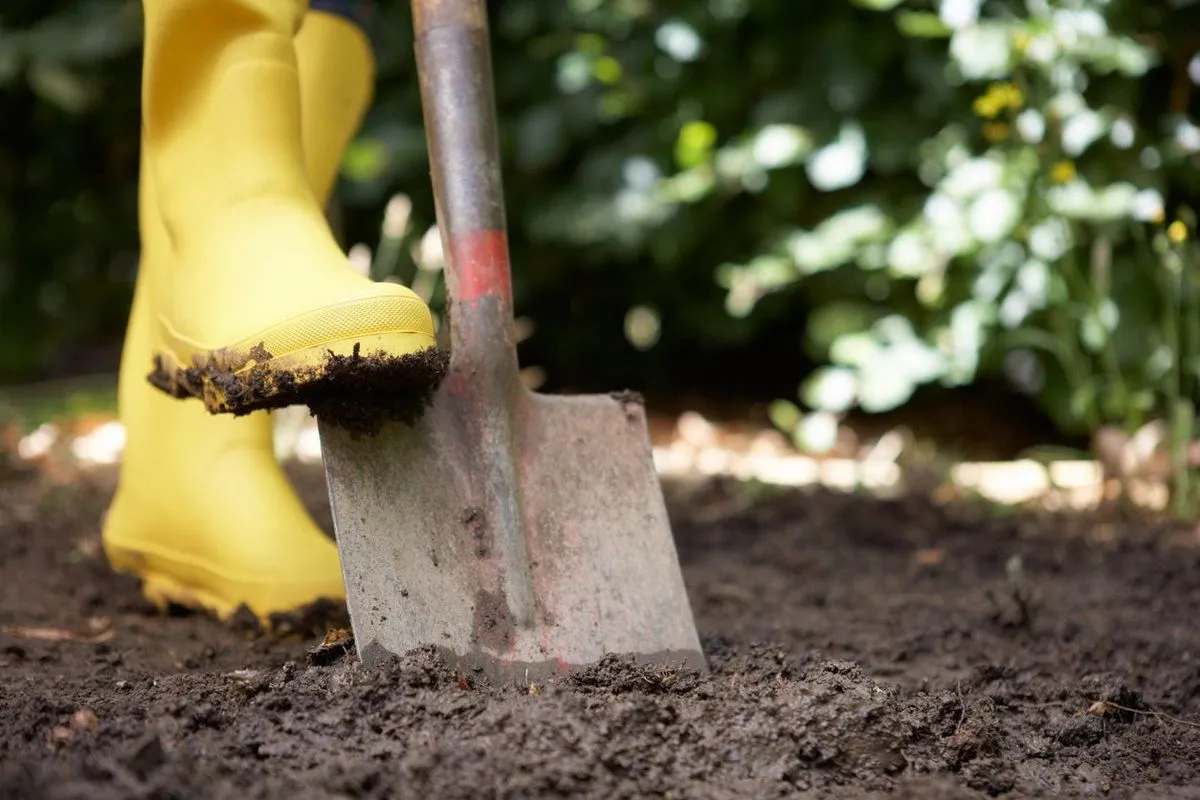
6- Spade
A spade is a versatile gardening aids for seniors used for a wide range of gardening tasks. It can be used for digging holes, turning soil, creating borders, and moving materials like soil, gravel, or compost. Spades come in various sizes, with longer handles providing greater leverage but also increasing the overall weight of the tool. When selecting a spade, look for one with a sturdy, rust-resistant blade and a comfortable handle. A D-shaped foot rest on the blade can help you apply more force when digging. With a good spade, you can efficiently tackle a variety of gardening projects.
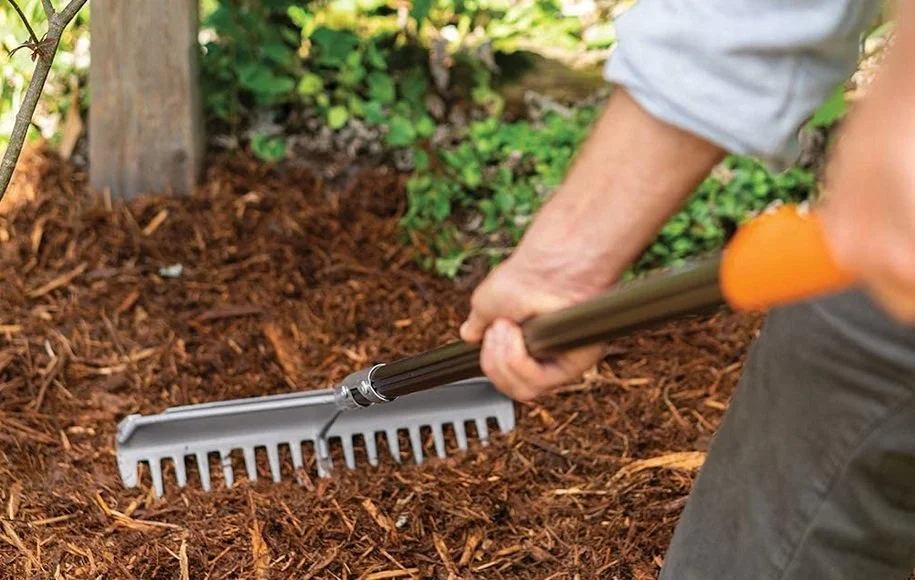
helpful tools to make gardening easier for seniors
7- Rake
A rake is an essential tools for gardeners 50 and older used to gather leaves, grass clippings, and other debris from lawns and gardens. It typically consists of a long handle and a head with a series of tines or teeth that can be adjusted to rake different types of materials. Rakes are available in various sizes and materials, with metal tines being more durable but potentially damaging to delicate surfaces like lawns. Additionally, rakes can be used to level soil, break up clumps of soil, and even create furrows for planting seeds. By using a rake, gardeners can maintain a tidy and healthy outdoor space.
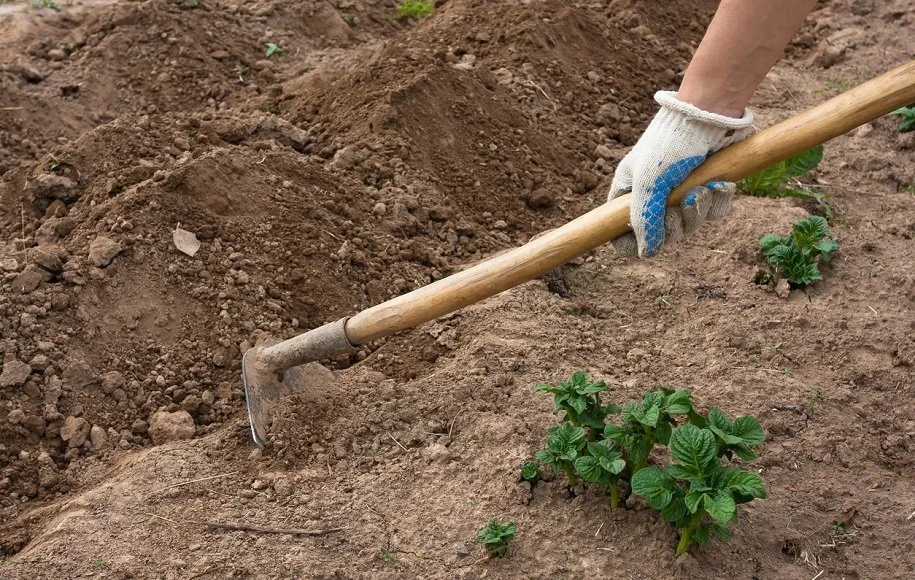
8- Hoe
A hoe is one of the oldest agricultural tools used for a variety of tasks, including soil cultivation, weeding, and harvesting root crops. The design of a hoe can vary depending on its intended use. For example, an hoe with a wide, flat blade is ideal for breaking up heavy soil, while a hoe with a narrow, pointed blade is better suited for weeding between closely spaced plants. When choosing a hoe, consider the type of soil you’ll be working with and the specific tasks you need to perform. A comfortable handle and a sharp blade are essential for efficient and enjoyable gardening.
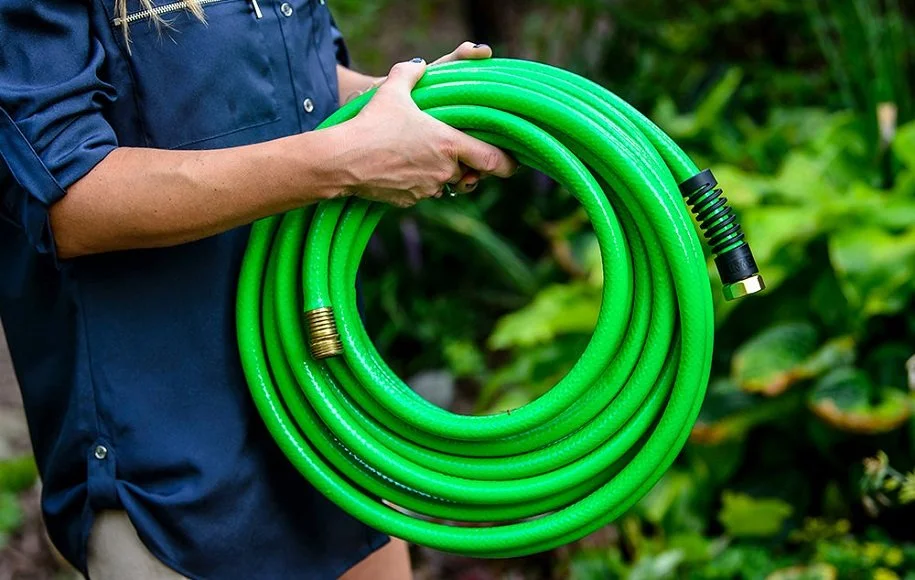
9- Garden Hose with Adjustable Nozzle
Irrigation is undoubtedly vital for gardening at home or on farmland, and you need to do it properly using the right equipment. A garden hose with an adjustable nozzle is one of the gardening aids for seniors for watering plants and maintaining your garden. These hoses come in various lengths and diameters, allowing you to choose the right one for your specific needs. The adjustable nozzle allows you to control the water flow and spray pattern, making it easy to water different types of plants and reach hard-to-reach areas. When selecting a garden hose, consider factors such as length, durability, and the material it’s made of. High-quality hoses are made from durable materials that can withstand outdoor conditions and resist kinking. To prolong the life of your garden hose, store it in a cool, shaded area when not in use and avoid kinking or twisting it.
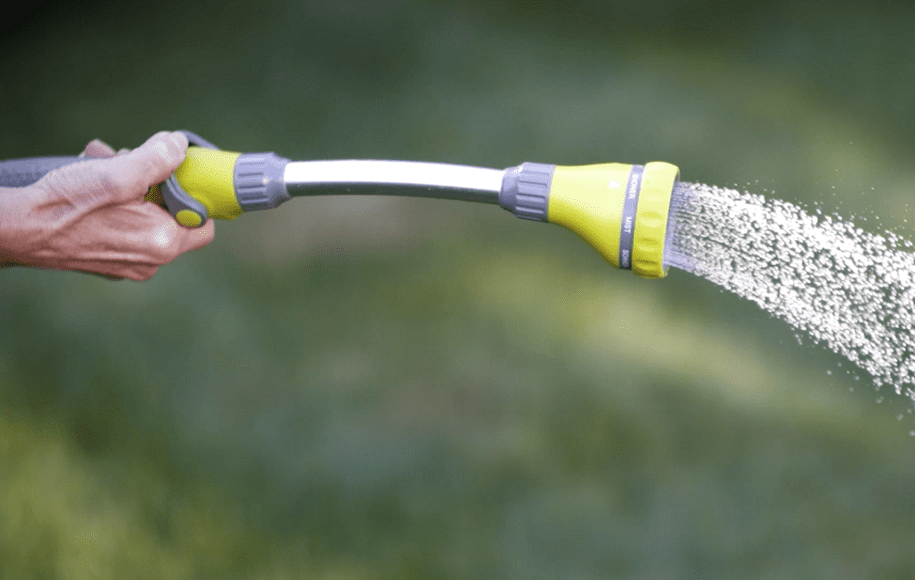
10- Watering Wand
A watering wand, also known as sprinkler wand, is a long-handled tool used to water plants. It allows you to mimic rainfall, delivering water directly to the roots of your plants. The extended reach of the wand makes it ideal for watering tall plants, hanging baskets, and hard-to-reach areas. Watering wands come in various lengths, typically ranging from 25 to 120 centimeters, so you can choose the one that best suits your needs. A longer wand is perfect for taller plants or hanging baskets placed high up, while a shorter wand can reach into tight spaces.

11- Watering Can
Watering cans come in a variety of materials, shapes, sizes, and nozzle types. Plastic watering cans are lightweight and easy to handle but may be less durable and prone to cracking or breaking. Metal watering cans can be prone to rust. The size of the watering can you choose depends on your needs. Smaller cans are suitable for small gardens, while larger cans may be more suitable for larger areas but can be heavier. The handle of the watering can should be comfortable to hold, and some watering cans have two handles for easier carrying. Consider your gardening needs and preferences when choosing a watering can.
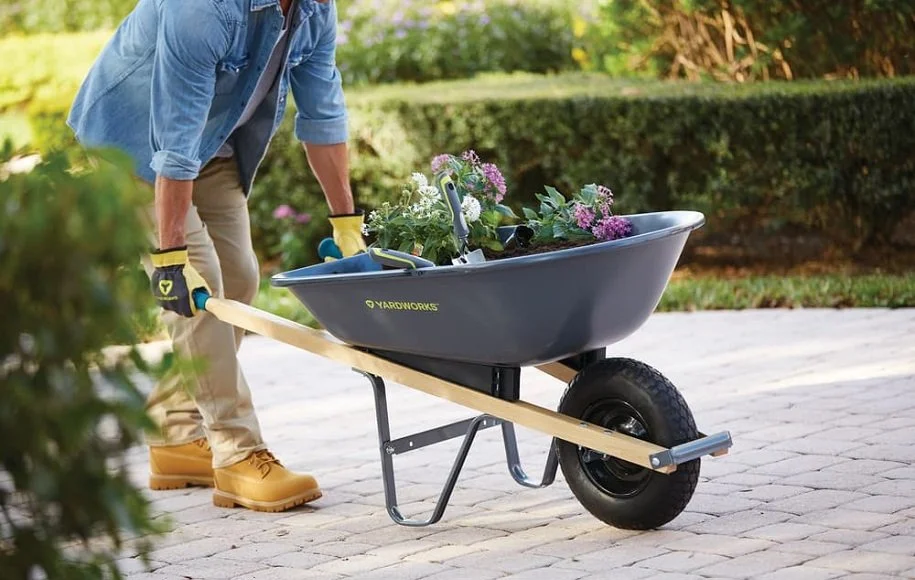
12- Wheelbarrow
A wheelbarrow is a hand-operated cart with a single wheel and two handles. It’s commonly used for carrying heavy loads, especially in gardening, construction, and agriculture. While the traditional design has a single wheel, modern wheelbarrows often feature two wheels for improved stability and maneuverability. The choice between a one-wheel or two-wheel wheelbarrow depends on the specific task and the terrain. Two-wheeled models are generally more stable but can be less maneuverable in tight spaces. Regular maintenance, including cleaning and proper tire inflation, is essential to prolong the life of a wheelbarrow and ensure efficient use.
Concluding Remarks: Incorporating Gardening into Daily Life
Gardening offers a wealth of health benefits for seniors. Engaging in this activity can significantly improve both physical and mental well-being. For seniors, gardening provides a sense of purpose and accomplishment, fostering a positive outlook on life. Even small gardening projects can yield substantial health benefits, making it an accessible and rewarding activity for people of all ages. It can provide a sense of accomplishment and satisfaction, especially for those who may be retired or have limited mobility.
Seniors don’t need a lot of fancy equipment to garden at home, but some gardening aids for seniors can help them get better results and keep themselves safe. The tools we’ve reviewed in this article are great for getting started in gardening and planting flowers and plants. By reviewing and purchasing them for your elderly loved ones, you can give them the gift of easy gardening so they can grow their favorite plants and trees.

Frequently Asked Questions
What are gardening tools used for?
Gardening tools are used for planting, maintaining, and cultivating indoor plants, small gardens, roof gardens, or larger agricultural areas.
When buying a wheelbarrow, should I choose a one-wheel or two-wheel model?
Most people can successfully use single-wheel wheelbarrows. They are more maneuverable and easier to dump. However, if you have limited strength or want more control when moving heavy loads, a two-wheel wheelbarrow might be a better choice.
What is the difference between anvil and bypass pruners?
The main difference between anvil and bypass pruners lies in their blade design. Anvil pruners have a flat anvil against which the blade cuts, similar to a knife on a chopping board. Bypass pruners have two blades that pass each other like regular scissors. Generally, anvil pruners are best for dead or dry wood, while bypass pruners are better for live, fresh plant material.
Should I use loppers in addition to garden shears?
Loppers are essentially larger garden shears with longer handles that provide more leverage. If you don’t have tall trees or high-reaching plants and can manage with regular garden shears, you may not need loppers.
